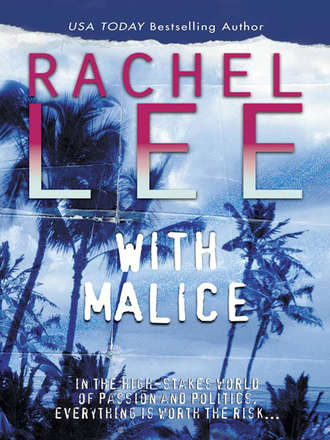
Полная версия
With Malice
So he called robbery-homicide and asked to speak to Detective Sweeney. Much to his amazement, she was there.
“Yes, Senator,” she said. “What can I do for you?”
“I was wondering if I might be able to get into my house. There are some things I want for my daughters. Frankly, Detective, they need the comfort of the familiar right now. Their own clothes, their own toys, their own pillows and blankets. I left Washington in such a hurry this morning that I didn’t even pack for them, other than bringing Belle’s favorite stuffed animal and Catherine Suzanne’s blanket.”
“I understand.” Her voice remained detached. “Let’s see…I’ll be leaving here in about an hour. How about I meet you at your house in an hour and a half?”
“That would be fine. Thank you, Detective.”
“No problem, Senator.”
But as he hung up, he realized it might be a problem for her. Through the detachment of her voice, he had sensed great fatigue. Well, she’d been up most of the night. He brushed away the concern that he was imposing even more on her limited time. His girls came first, and he wasn’t going to let their needs go unmet.
The phones at his parents’ house had been ringing most of the day, and the line he had been on rang as soon as he hung up. The family wasn’t answering. His parents’ assistant, Keith Fairfield, was taking all the calls and messages in the office four blocks away, through the magic of call forwarding. Poor Keith. He was probably ready to tear his hair out…as were his own secretaries, now that he thought about it.
He was going to have to speak to the press at some point. There was no escaping it. At the very least, he needed to issue a statement. He realized without guilt that he was trying to avoid what had happened, unwilling to address it head-on.
He shook his head as if trying to clear it, feeling the fatigue of a sleepless night and the unbearable weight of grief trying to bend him, break him. It would be nice to let go, but it wouldn’t do any good. Nor could he afford to.
The girls were outside with their grandparents, splashing in the pool, resilient as only the very young could be. He watched them for a few minutes through the glass doors, a faint smile lifting the corners of his mouth. His daughters were his raison d’etre, even more than the political career to which he devoted so much of his time and energy. It did his aching heart good to see them enjoying themselves, to see that they could escape the grief that had haunted their lives, even for a little while.
Then he went to dress for his meeting with Karen Sweeney, well aware that the press would be there, and would demand an answer to the stupidest question in the world: “How do you feel, Senator?”
He shook his head again, feeling as if cobwebs clung to his brain, and dressed for television because he was going to be on television whether he wanted to or not.
So he wore dark slacks and a dark shirt. He took a few minutes to shave, but he would be damned if he’d put on a suit. They were just going to have to take him as he was.
Karen Sweeney awaited him inside the house. The criminologists were still working the scene, although their number had shrunk considerably since the early hours. Now they were down to Millie and her team, working the two rooms they were sure had been invaded, leaving no dust ball unturned. Millie’s thoroughness was famous, though there weren’t many dust balls. Apparently Abby’s thoroughness had been famous, as well.
“How’s it going, Millie?”
The taller woman straightened and rubbed her lower back. A grimace creased her features. She was in the senator’s home office, checking out the carpet. “I think we’ll be done in a couple of hours.”
“Find anything that sticks out?”
“Well, I’ve got enough latents to start my own fingerprint bureau. God knows how many people go through this house on a given day. The file cabinets were jimmied with a crowbar, though. It’s like somebody tried to pick the locks, gave up in frustration or because of time, and just laid into them with a metal bar. The senator needs better cabinets.”
“I got the impression that the stuff here is mostly copies of things for his personal use. He probably isn’t worried about anyone getting into it. He said there was nothing important there.”
“Somebody sure had a different opinion.” Millie sighed and pulled off her rubber gloves. “I’m going out for a smoke. If any of my team start looking for me, they can find me out front.”
“Okay.”
Left alone in the senator’s office, Karen walked around, taking in more detail than she had that morning. A stereo and TV were hidden in an armoire on one wall. Putting on gloves, she opened it all the way and looked inside.
Apparently the senator enjoyed thrillers. He had a stack of DVD movies, among them All the President’s Men, a film about the two Washington Post reporters who’d exposed the Watergate cover-up. Interesting choice for a man well on his way to the White House.
He also had a copy of The Contender, a movie about all the ugly maneuvering around the nomination and confirmation of a woman for the vice presidency.
Cautionary tales, perhaps?
His choice in music was eclectic, from Jimmy Buffett to Beethoven. She almost smiled at that. Her own tastes were also eclectic, a little of this and a little of that.
“Karen?” called a voice from the front of the house.
“Yes?”
“The senator’s here.”
“Let him in. I’m coming.”
She met Grant Lawrence in the foyer. The first thing she noticed was how grave he looked. How somber. But also how well controlled.
He shook her hand. “Please thank the officer out front for me,” he said. “He kept the press at shouting distance.”
She half smiled. “I wish he could keep them in Timbuktu, but I don’t have the authority for that, so we’ll settle for shouting distance.”
He responded with a faint smile of his own.
“Do you just need to go to your children’s rooms?”
“Well, I could use some of my own clothes, if that’s okay. And I’ve got a couple of spare suitcases in my closet to put things in.”
“That’s okay. I’ll go with you, if you don’t mind.”
It was not a request, and she saw that he realized that. He nodded. “Any idea when I get my house back?”
“Criminology has to release it. It might be a few days.”
They began ascending the stairs together.
“It’s not,” he said, “that I’m eager to come back here. In fact, I’d rather not live here ever again. But my daughters…they’re going to need the stability. So I guess I have to come back, at least for a while.”
She reached in her pocket and handed him the business card of a cleaning service. “These people will get rid of the mess.”
He paused on a step and looked down at the card. “Thanks. You know, it never would have occurred to me that this kind of business exists.”
“It’s an ugly world.”
He didn’t answer, and she looked at him from the corner of her eye. His face had become stony, as if he was fighting some terrible internal battle. Then he shook his head and tucked the business card in his slacks pocket.
They went first to his bedroom, to get the suitcases. She stood diffidently to one side as he pulled them out and threw a few of his own clothes in them, suits, shirts, underwear, some casual clothes.
Then she followed him to the girls’ rooms, where he emptied drawers and closets of every wearable thing. The suitcases full, he carried them downstairs and put them by the front door. Karen stood on the landing and watched.
When he returned upstairs, his face seemed even grimmer. He pulled out duffel bags from the closet in the playroom, stuffed their pillows in one, then began to go through the toys, deciding which to take.
That was when Karen, unwillingly, began to feel her own heart ache for this man and the burden he bore. He lingered over each toy, as if remembering some special moment.
For the first time she realized that even his children’s toys held memories of Abby for him. Saddened, she looked away.
“Okay,” he said. “I’m all set. I’ll get out of your way.”
She helped him load the duffel bags and suitcases into his car. The determined reporters, who had lingered all day, shouted questions their way. Karen looked at Grant and saw in his eyes that he’d come prepared to speak to them, like it or not.
“Shall we do it together?” she asked him.
“Are you allowed to speak for the department?” he asked. Obviously he was familiar with the ins and outs of official spokespersons.
“I only wish they’d give me a P.I.O. on this,” she said. “Unfortunately, I’m it. So yes, I can speak for the department. Whether I want to or not.”
He smiled, a brief flicker of the smile that half of America knew so well. It was even more impressive face to face, warm and open. Then the smile died. “I guess we’re both here, whether we want to be or not.”
Karen signaled to the officer at the police line, and he raised his hands to get the reporters’ attention. Once Grant’s bags were in his car, she accompanied him to the cordon. A flurry of shouted questions greeted them, but she merely looked on in stony silence until they quieted.
“As you’re aware,” she began, “Abigail Reese was murdered in the residence of Senator Grant Lawrence last night. Ms. Reese lived in the residence, and had lived and worked with the Lawrence family for sixty years. This is obviously an ongoing investigation, and I’m not going to discuss details, except to say that we have a number of leads and we are pursuing them. Senator Lawrence has agreed to say a few words, but please understand that he will not discuss the details of the case, either. And keep it brief. His family is grieving, and he’d like to get back to them.”
She turned to him. “Senator?”
The change was almost palpable. He was still the same wounded, somber man who’d walked into the house a few minutes before. But he was also Senator Grant Lawrence. He spoke with calm, quiet dignity.
“Abby Reese was at the very heart of my family. When my parents had to be away on location, Abby was there. Whenever I had a heartache or a joy, Abby was there. She was there when I graduated high school and college. She was there when I married Georgie. She was there when my children were born. She was there when Georgie died. And the very last thing my daughters did, before going to bed last night, was to call Abby to say good-night. There are no words to describe our loss. And frankly, I’d rather not have to find them. Suffice it to say that I have lost a lifetime mentor, friend, surrogate mother and companion. And I will miss her always.
“I will, of course, cooperate fully with the Tampa Police Department in their investigation of this brutal and senseless murder. I have no doubt that they will find the person who did this terrible thing. And now I’ll try to answer a few of your questions, but as the detective said, my family is grieving and I want to get back to them.”
“How was she killed?”
Karen spoke up. “Again, I won’t discuss details of the investigation at this point. The medical examiner and criminalists are still gathering and reviewing evidence.”
“Was it a burglary?”
“It’s too early to tell,” Karen said. “Burglary is one possible motive we’re looking at, yes.”
“Senator, will this affect your intention to run for the presidency?”
She saw him bristle. “I haven’t announced any such intention yet. And that’s the furthest thing from my mind right now.”
“Will you hire another black housekeeper?”
Now his nostrils flared. “There would be no way to replace a lost family member.”
“And that’s enough,” Karen said.
“Is this related to your wife’s death?”
The senator drew a breath, as if calming himself, then locked eyes with the reporter. “I won’t even dignify that with a response. My wife died in an auto accident.”
“That’s enough,” Karen said again, slipping an arm in front of him to drive the point home. “The department, and I’m sure the senator, will discuss further developments as they arise. Thank you.”
She pivoted on her heel and drew him toward the car. “I’m sorry, Senator.”
He nodded. “I’m used to it. It is, unfortunately, part of the price of holding public office. And perhaps, in some way, part of the beauty of the American system of government. Secrets are dangerous things.”
“Maybe so. But so are ugly rumors.”
As he was about to climb into the driver’s seat, he looked toward a small knot of people gathered under a tree. He turned to her. “May I have a moment, please?”
“You’re a free man, Senator.”
“Thank you, Detective Sweeney. For everything.”
She watched his shoulders sag a bit as he stepped toward the group of neighbors.
Grant needed a familiar face, and he found it in Art Wallace. He extended his hand as Art walked toward him, leaving the other neighbors behind as he crossed the cordon.
“I’m terribly sorry for your loss,” Art said.
“Thanks, Art. The jackals don’t make it any easier, but I guess I have to deal with them.”
Art nodded, then angled his head toward the detective. “Do they know anything?”
“Not a lot. It looks like a burglary.” Grant closed his eyes for a moment. “Jeez, Art. She probably died for some files that anyone could have had for the asking.”
Art shook his head slowly. “I don’t know what to say, Grant. If there’s anything I can do, anything at all…”
“Actually, I came over to ask, are your daughters home with you?”
Art nodded. “Yes. My ex is getting married again, so I’ve got them for three months.”
Grant reached out and squeezed his shoulder. “I’m sorry, Art.”
“It was bound to happen.” Art’s wife had left him just over a year ago, and his pain was a palpable thing, even though he never referred to Elizabeth in any other way than as his ex. “So yes, I’ve got the girls for a few months. I can’t tell you how grateful I am for that.”
“I can imagine.”
Art nodded, then smiled. “We should be grateful for our blessings as they come. Now, what can I do to help you out?”
“This is going to be hell for the girls. They need a few days to adapt, but then they’re going to need to get back in school. And I don’t know how long it’ll be before they’ll give me the house back. Or how long it’ll take to…” He couldn’t speak the words. They stuck in his throat.
“They’re welcome to stay with us, Grant. They’ve always been welcome. You know you don’t need to ask.”
“I know, Art. It shouldn’t be for long. I hate to impose.”
Art took his hand firmly. “Grant, we’ve been neighbors for ten years. You’re not imposing. I’d be glad to help, and you know Lucy and Jessie love your daughters like sisters.”
Grant managed a chuckle. “And they fight like sisters.”
“That’s part of the package,” Art said, smiling. “It’s not a problem. Really. That’s what friends do.”
“You’re good people,” Grant said. “Look, I need to get back home. I’ll call you when I think the girls are ready to get back to school.”
“We’ll look forward to it,” Art said. “Take care of your family.”
Grant looked up into a graceful live oak, as if trying to divine the secrets of the universe from its gnarled limbs. “I don’t know if it’s a matter of me taking care of them or them taking care of me.”
Art clapped a hand on his shoulder. “I know, Grant. I know. Get on home to them.”
“Thanks, Art.”
“A friend?” Karen asked when he returned to the car.
“A friend.”
“You seem to make close friends, Senator.”
He studied her eyes for portents of an ulterior motive but saw none. “I do, I guess. In the end, what else is there but those we love and the memories we make with them?”
She nodded, glancing toward Art Wallace as he walked back around a copse of trees toward his house. “That’s a beautiful sentiment, Senator. Do you ever disagree with any of your friends?”
“What are you suggesting?”
Those clear gray eyes of hers returned to him. “I just wondered if you ever had any disagreements with your neighbors. People are human, after all. This neighborhood can’t be Eden before the fall.”
“No, it’s not. Of course we don’t all see eye-to-eye on everything. Fortunately, we’re all too civilized to get nasty about it.”
She nodded. “What kinds of things do you disagree about?”
He gave her a crooked smile. “Politics, mainly. Given my position, I’m a lightning rod for such discussions. But they’re my constituents, too, so I listen. Matt Witherspoon, across the street, cordially dislikes my position on gun control. I have no doubt he votes against me.”
She nodded. “And the guy you just talked to?”
Now a look of faint amusement brightened his gaze, momentarily erasing his grief. “Art? Art and I have been close friends for about ten years now. It doesn’t bother me in the least that he volunteers for Randall Youngblood.”
“Youngblood?”
“The head of the cane growers’ association. He’s lobbying against my environmental bill.”
“And your neighbor volunteers for him?”
“Why not? It’s his constitutional right to oppose legislation.” He cocked his head. “You know, Detective, it’s entirely possible for gentlemen to disagree and still be friends. In fact, I don’t believe Congress has settled legislation at gunpoint once in its entire history.”
Her face revealed nothing. “It’s my job to ask these questions.”
He felt a twinge of embarrassment. “Of course it is. I’m sorry. It’s just that I’ve never had a disagreement with any of my neighbors that’s even reached the level of raised voices.”
She nodded, still expressionless.
“Thank you for your help, Detective.”
“It’s my job, Senator. I’ll keep you posted.”
He drove away, headed back to grief, but for the moment feeling only shame at his overreaction to Detective Sweeney’s questions. He usually displayed more self-control than that.
But there had been enough ugliness in the last twenty-four hours, and he was damned if he was going to start suspecting everyone he knew.
At least not until he had evidence.
6
After the senator disappeared down the street, Karen decided it might be a good time to try to interview the neighbors again. This morning, by the time she’d sent some uniforms around to ask questions, everybody appeared to have gone off to work. Or maybe they weren’t answering their doors. But now it was late afternoon, and surely some of them would be home.
Unfortunately, most still weren’t. She worked her way up and down the street, and managed to talk to only two women, both of whom denied having seen or heard a thing. That left the senator’s next-door friend, the guy who said he’d heard a car. He’d been gone, too, when they’d gotten around to trying to question him.
But he was home now, and he invited her inside pleasantly. He even offered her a cup of coffee. Ordinarily she would have declined, but she decided instead to accept, wanting to make this interview as comfortable and friendly as possible in the hope that this friend of the senator’s would relax enough to grow chatty.
As he gave her a mug of coffee and sat facing her across the coffee table between two sofas, he said, “I suppose you want to know if I know anything more about that car I heard last night.”
“That’s one of the things, yes. Delicious coffee.”
He beamed. “I can’t take credit for that. It’s a Starbucks blend.”
Of course. Starbucks. In this neighborhood she was rather surprised it wasn’t something even more exotic. “Well, you brewed it perfectly,” she said, and smiled.
“Thank you.” He managed a look of embarrassed pleasure to perfection. She found herself wondering if it was real or practiced. Then she chided herself for being unnecessarily suspicious.
“But about the car,” he said. “I’m not sure it had anything to do with what happened to Abby.” His lips trembled a bit at the outer corners, and he paused a moment, clearly gathering himself. “I mean, how would I know?”
“Of course you don’t know,” she said reassuringly. “But I have to follow every possible lead.”
“Of course.” He nodded and put his own coffee mug on a coaster on the highly polished table. “Well, I don’t really know anything except what I told you. I think it was about one o’clock. I seem to remember glancing at the digital clock on the headboard. Anyway, I can’t be certain of the exact time.”
She nodded and pulled a pad from her jacket pocket, making notes. “You said it had a loud muffler.”
“Yes. One of those things some people seem to like. But it did have a muffler. I’ve heard cars without one. There’s no mistaking that sound.”
“No, there isn’t.” She nodded pleasantly. “Did it start or stop?”
He cocked his head, thinking. “No, I don’t think so. Or at least I didn’t hear it. What woke me up was the gunning of the engine.” He nodded to himself. “Yes, that’s what it was. The car’s engine gunned at least a couple of times. Then it drove away down toward Mulberry.”
Karen scribbled a few more notes, then glanced at the toys in one corner of the room, a dollhouse with dozens of pieces of furniture. “Did your wife hear it, too?”
He seemed to jerk, an almost spastic movement. His face grew as rigid as a mask. “My ex-wife,” he said shortly, “is taking a world cruise with her new husband.”
“I’m sorry. I assumed, because of the toys…”
He glanced toward the corner, then nodded stiffly. “It’s all right. It’s a natural assumption. My daughters are staying with me until their mother returns.”
She nodded, making another note, although it didn’t seem relevant. “I understand you disagree with Senator Lawrence over S.R. 52.”
He looked a little startled, then laughed. “Oh, yes. I suppose Grant told you that. We’ve disagreed about quite a few things politically over the years. But people can disagree about politics without becoming enemies.”
“That’s what Senator Lawrence indicated.”
Art Wallace nodded. “In fact, I’m volunteering for Randall Youngblood right now. You know, the group lobbying against the bill? Grant knows that.”
Again she nodded. “Why are you opposed to the bill?”
“Because I think it will devastate farmers. It’s just that simple.”
Karen slipped her coffee, smiled at him again. “Since you know Senator Lawrence so well, I was wondering if you know his enemies.”
His eyes widened a shade, and he chuckled. “He’s a politician, Detective. He probably has hundreds of enemies.”
“Of course.” She smiled deprecatingly. “I just wondered if you know of any who might go this far.”
“To kill that wonderful old woman? No way. Politics can get dirty, Detective, but not to that extent. I can’t imagine that anyone I know would do such a thing under any circumstances.”
Just then twin girls of about seven bounced into the room, trailed by a middle-aged woman in gray.
“Daddy, Daddy!” they bubbled over. “Nanny took us to the zoo. And we saw lions!”
Karen waited while Art Wallace hugged his daughters to him as if he never wanted to let go. They beamed and chattered, utterly oblivious of her presence.
Finally, quietly, she excused herself, not wanting to interrupt the happy scene. And not at all sure she needed to ask Art Wallace another single thing.
She had something else to do, anyway. Something equally important, at least to her.
Karen drove back to the alley where the unidentified woman had been found. As expected, Dave Previn was nowhere to be seen. Not that there was much he might have learned by staring at this alley.
Still, it seemed wrong that the trail of the woman’s death would be left to grow stale, so she paced the alley and remembered the horror that had been visited upon the woman whose body had been found here. Found here. She’d all but let that slip out of mind in the flurry over the Lawrence case. This woman’s body had almost certainly been moved. Had she even put that in her report?









